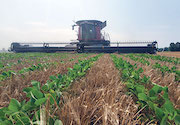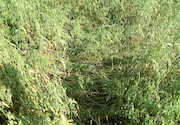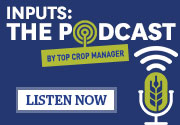| |
| |
 |
 |
| |
 |
|
@{mv_date_MMM d, yyyy}@ |
|
| |
As there are no established thresholds for fall armyworm, OMAFRA’s Tracey Baute says growers will have to make a judgement call on whether the level of injury could impact the crop’s winter survival.
» Read more...
Grain Growers of Canada have responded to AAFC’s proposed fertilizer emission reduction target with three recommendations, noting there is “no one-size-fits-all approach to meeting this target.”
» Read more...
McDonald has always been interested in plants, which led her to the University of Guelph, plant pathology, and an interest in crop protection. A summer job took her to the Holland Marsh, the main site of her research ever since.
» Listen now...
|
| |
|
| |
 What happens when you bring together farmers, researchers and other partners to advance agricultural innovation? That’s what the AAFC Living Laboratories Initiative is working on in regions across Canada. In Ontario, a key part of the initiative is a set of on-farm trials to co-develop leading-edge practices that make sense for farmers while making Canadian agriculture more sustainable.
» Learn more...
What happens when you bring together farmers, researchers and other partners to advance agricultural innovation? That’s what the AAFC Living Laboratories Initiative is working on in regions across Canada. In Ontario, a key part of the initiative is a set of on-farm trials to co-develop leading-edge practices that make sense for farmers while making Canadian agriculture more sustainable.
» Learn more... |
| |
 Does it make sense to apply a plant growth regulator in winter cereals? A newly released study, led by AAFC’s Brian Beres, analyzing the effects of dose and application timings of the PGR trinexapac-ethyl (sold under the trade name Moddus in Canada) on lodging, yield and quality of winter cereals suggests there’s a role for trinexapac-ethyl in some systems.
» Learn more...
Does it make sense to apply a plant growth regulator in winter cereals? A newly released study, led by AAFC’s Brian Beres, analyzing the effects of dose and application timings of the PGR trinexapac-ethyl (sold under the trade name Moddus in Canada) on lodging, yield and quality of winter cereals suggests there’s a role for trinexapac-ethyl in some systems.
» Learn more... |
| |
|
| |
 The Canola Council of Canada recently launched Canola 4R Advantage, a program designed to help growers initiate or advance nutrient stewardship and fertilizer efficiency on canola farms. Curtis Rempel, vice-president of crop production and innovation for the Canola Council of Canada, joins co-host Stefanie Croley to discuss the program and break down the benefits available to canola producers.
» Listen now
The Canola Council of Canada recently launched Canola 4R Advantage, a program designed to help growers initiate or advance nutrient stewardship and fertilizer efficiency on canola farms. Curtis Rempel, vice-president of crop production and innovation for the Canola Council of Canada, joins co-host Stefanie Croley to discuss the program and break down the benefits available to canola producers.
» Listen now |
| |
|
| |
|
|
| |
| |





